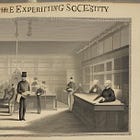What if societies were (deliberately) built to learn? (part one)
Lab-coated idealism: Considering a 🌎 world that doesn't lie to itself
Here (and in subsequent pieces) I am going to discuss in detail Donald Campbell’s seminal 1971 paper, “Methods for the Experimenting Society,” which proposed, for its time, a groundbreaking framework for addressing society's most pressing challenges through rigorous experimentation.
Campbell advocates for an “experimenting society” – a society that systematically uses experimentation and empiricalevidence, particularly randomised controlled trials, to evaluate social programs and policies. Campbell was well ahead of his time - perhaps eternally so - by forcefully suggesting that we adopt empirical methods as the best way forward to understand and hopefully solve big social problems.
Here’s a podcast and some notes on the paper:
The Experimenting Society
Campbell argued that the answers to complex societal problems—such as alleviating poverty, reforming criminal justice, improving public health, and the one hundred and one other issues which continue to nag away at us—are rarely intuitive and obvious. Instead of relying on assumptions or untested theories, he championed the use of empirical and experimental methodologies to design, test, and refine social programs before going for anything like their widespread implementation.
This is a very challenging view of how we should organise our affairs - our societies are very complex, and deep, disinterested, motivated expertise, capacity and capability are, if we are honest, rare - and many of our problems have so many moving parts that any simplistic, reductionistic, view of how to solve them will be one that causes as many problems as it solves.
With those few caveats in mind, let’s examine the paper (link to original in reading list at bottom).
👋 Here in the BrainPizza Newsletter, I take a fresh look at life through an informed, empirical, neuroscience and psychology lens. I do regular in-depth treatments of topics such as our very human metabolism, George Orwell, AI hype, brain implants, memory, hunger, NIMBYism, thinking, how to write books, and much, much more, as well as occasional listicles, readings, book reviews, and commentaries. You can browse the archives here; if you’d like to get these regular in-depth emails in your inbox, you can subscribe here.
Topic below the line:
Big, big problems…
Characteristics of the Experimenting Society
Key Principles of the Experimenting Society
Why the Experimenting Society Matters Today
Challenges to Implementation
Analysis
Quotes from ‘The Experimenting Society’
Plus a reading list (yay)
And bonus content - Wim Hof, the Iceman (❄️🍦🧊… 😂) - our metabolism is complicated…
And more bonus content: 52 things someone else learned in 2024 (not me)
The next couple of pieces will examine why humans are the problem (and probably the solution, too) for implementing anything like Campbell’s vision of a society that can learn through deliberately experimenting to find solutions to problems, large and small). I’ll also try to think through an alternative to doing experiments within societies.
Next week's piece will focus on cities - why not sign up?
Big, big social and behavioural problems
Here’s a partial list - add some more in the comments if you’d like:
Dramatically and sustainably reducing global poverty
Effectively treating substance use disorders
Improving global public health responses - we can design better environments, for one thing
Reducing corruption and improving governance (effective institutions really matter a lot)
Tackling urban housing and homelessness crises (defeat the NIMBYs!)
Improving ageing population support systems
Improving mental health treatments (and improving access and delivery of mental health treatments)
Preventing dementia (seriously, the population of the planet is ageing quickly)
Ensuring universal access to high-quality education
Campbell would argue that the answers to these and similar problems are not intuitively obvious: reasonable people can disagree in good faith about what we should do to solve these problems.
But solve them we must. So how do we arbitrate between potential answers?
We shouldn’t do it based on our native intuitions and biases.
Instead, we need to try and conduct empirical interventions to try and figure out the ‘best’ way(s) forward.
In other words: we should try to become an ‘experimenting society’.




